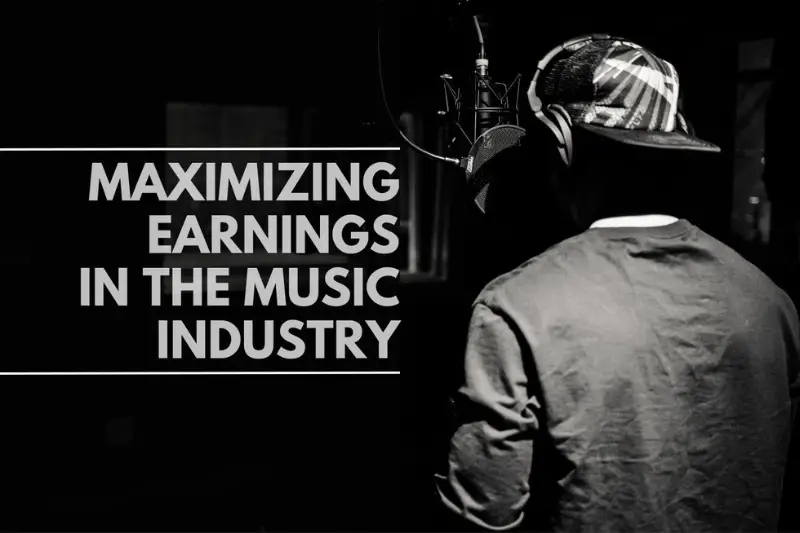Click here to get this post in PDF
In an era where being able to adapt fast is the name of the game, the music industry remains a viable prospect for creatives and small business owners willing to live on the cutting edge.
Whether you’re an artist, a creator, or an entrepreneur exploring synergies, there are many opportunities in the music business if you know where to look.
Understanding the Current Music Landscape
The digital revolution has overhauled how we consume music. Gone are the days when physical sales dominated.
Today, harnessing the power of music analytics can give you the edge. Data generated by an artist’s fanbase can be used to dial in release schedules, plan the best cities to include on a tour schedule, and build digital and real-world promotion campaigns.
Streaming Platforms
Platforms like Spotify, Apple Music, Tidal, Amazon Music, and Google Music reign supreme today. Every play counts and ensuring maximum reach on these platforms is paramount.
Live Performances
Live performances haven’t lost their charm. Analytics data can help you make touring a formidable income source by planning the shows and promotional campaigns around the demographic data of the artist’s fan base.
This lowers the risk as access to music analytics data shows where the investment will have the best chance of success.
Beyond ticket sales, there’s also merchandise, fan engagement, and brand building.
Working with Artists
Release quality productions can now be made on a laptop using affordable studio gear at home. Artists can even choose to produce their own material.
Spending hundreds of thousands on a high-end studio is no longer necessary if you want to start a label. Technology has truly leveled the playing field, though you still need talented performers, writers, producers, and mixing and mastering engineers to deliver a quality product.
Sync Licensing & Performance Royalties
It used not to be cool to have your music in a commercial. But gone are those times! The new cool is having your song drive a scene in the latest hit Netflix show or an Apple iPhone commercial.
Want to place a track in the background of a popular TV show or a video game? Making that deal happen with the right song and connections is possible.
Not only do those placements involve a sync fee, but there are also performance royalties that Performance Rights Organizations (PROs) collect for their writer and publisher members worldwide. Unlike mechanical royalties from streaming, these royalties can still add up to a respectable income.
Diversifying Revenue Streams
Now, more than ever, diversification is crucial.
Merchandise
Merchandising goes beyond the traditional T-shirt. Think innovative – digital stickers, virtual backgrounds, limited-edition memorabilia. Platforms like Shopify or Teespring can make this process seamless.
Leveraging Social Media Platforms for Promotion
Social Media is king, and artists go viral because of social media sharing all the time. But it takes more than just a random post. This is where music analytics data about the fan base can help again; you can plan a social media strategy around what the listeners want.
Different platforms cater to different audiences. Instagram might be visual-heavy, but TikTok offers quick engagement. X (formerly known as Twitter) can be an avenue for direct communication. Engaging, shareable, and, most importantly, authentic content is the key.
Email Marketing
Email Marketing offers direct access to your fanbase. This isn’t about spam; it’s about fostering genuine relationships. Exclusive content, sneak peeks, or even special offers can all be part of your email strategy.
SEO
For musicians and music-related businesses, SEO cannot be an afterthought. Optimizing posts about new music releases, descriptions, and general blog content around music-related keywords can make you discoverable.
Fostering Relationships and Collaborations
Just like in any other entrepreneurial business, networking is invaluable. Industry events, virtual and in-person conferences, and workshops can open doors you never knew existed.
Then there are Collaborations. An opening act for a bigger artist, a joint venture, or even a shared promotional campaign can have mutual benefits.
Co-writing songs is also a big part of this. It opens doors for you that otherwise might not be available, and the quality of the music output will most likely increase. Most of the biggest hits in the history of pop music were co-written by two or more writers.
I’ve done hundreds of co-writes myself, and without exception, it always led to better songs and better business results.
Conclusion
The music industry, with its multiple avenues for earnings, offers fertile ground for entrepreneurial artists and small business owners alike. A strategic, multifaceted approach is the way forward.
There are some unknowns in the industry’s near future; it’s yet to be seen what the implications of AI will be on the music industry.
But as any startup business owner knows, being able and willing to adapt is the key. With that approach, nothing will stop you from building a successful business, even in an industry in the middle of big changes.
Tero Potila Bio:
Tero is a professional music composer and producer. His career combining knowledge and experience from music, TV, film, ad, and game industries gives him a unique perspective that he shares through posts on teropotila.com.
You may also like: Italian Duo Mathame Release New Mix via Apple Music

